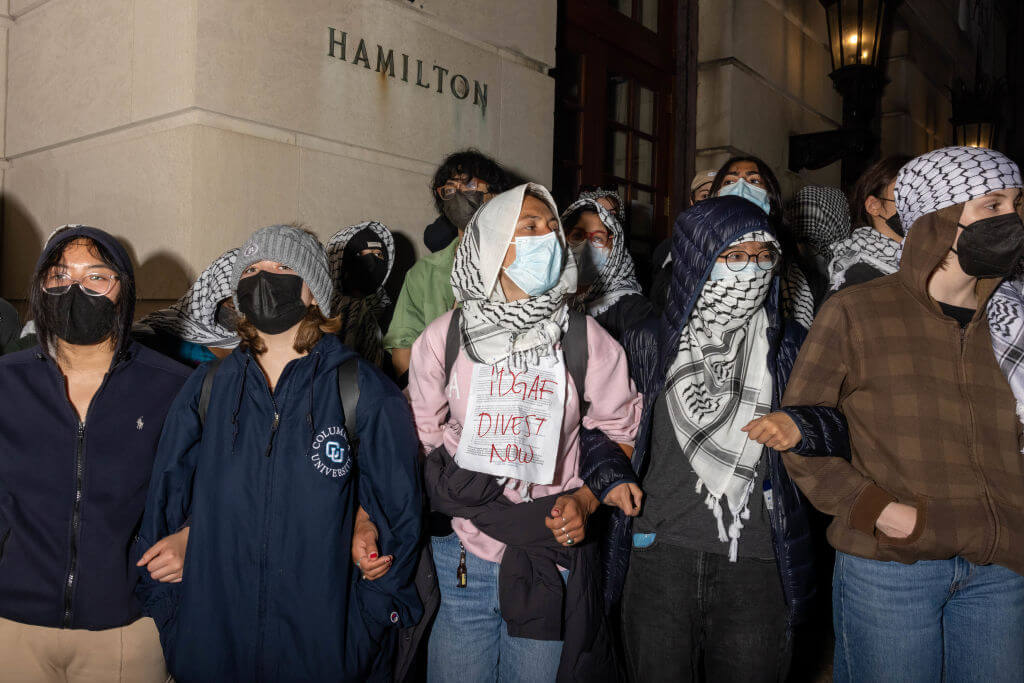Columbia threatens to expel students who took over building, as Northwestern students agree to dismantle anti-Israel encampment
Columbia students draped an “intifada” banner down Hamilton Hall, a university building that has been the site of student takeovers in the past

Demonstrators lock arms to prevent authorities from reaching fellow protestors who barricaded themselves inside Hamilton Hall at Columbia University.
(JTA) — Monday night marked a turning point in the weeks-old campus pro-Palestinian protest movement: Protesting students at Columbia University took over a university building there, draping an “Intifada” banner from the roof.
And on Tuesday, the school acted swiftly, threatening to expel those students. In a statement, Columbia spokesperson Ben Chang said, “Students occupying the building face expulsion.” He added: “Protesters have chosen to escalate to an untenable situation — vandalizing property, breaking doors and windows, and blockading entrances — and we are following through with the consequences we outlined yesterday.”
Protesters had clashed with maintenance staff and erected barricades inside and outside the building as they took over Hamilton Hall, the site of notable student protests in the past, according to photographs and reports in the student newspaper, the Columbia Spectator.
The takeover came hours after the university ordered students to leave the 10-day old encampment following failed negotiations with protest leaders. University officials said they had offered to increase financial transparency but not to divest from Israel, another demand of the protest movement that launched in response to the seven-month old Israel-Hamas war.
Many students left the Columbia encampment by the 2 p.m. deadline to vacate or risk suspension, but others remained and are being suspended, the university announced. The students who entered Hamilton Hall acted autonomously, according to a statement by the Columbia University Apartheid Divest protest group, but the group warned the university that if armed police or soldiers enter campus, “Students’ blood will be on your hands.”
The university announced Tuesday morning that it had limited access to campus to students living in a handful of residence halls and essential personnel only.
Meanwhile, at Northwestern
In a first, students who created an encampment to protest their college’s ties to Israel have agreed to dismantle it, as Northwestern University reached a deal with the protest faction there to increase transparency into the school’s investments. The agreement came Monday night.
At Northwestern, where the encampment had been in place since Thursday, the Northwestern University Divestment Coalition protest group said the agreement around investment transparency was “an immensely meaningful first step to divestment” that would also aid Palestinian and anti-Zionist students on campus.
“We will continue to protest until Northwestern concedes full divestment and until Palestine is free,” the group wrote in a statement. “This is not the end, just the beginning. We hope this agreement serves as the floor, not the ceiling, and that other student organizers have even more leverage than they do already.”
The university said in a statement that the agreement “was forged by the hard work of students and faculty working closely with members of the administration to help ensure that the violence and escalation we have seen elsewhere does not happen here.”
Students agreed to leave just a single tent erected on Deering Meadow, the field where the encampment stood, and the student group said it was sending tents and other supplies to other campuses in Chicago and the region where encampments have emerged.

Banners hanging from the fence outside Northwestern University during a pro-Palestinian protest, Evanston, Illinois, April 27, 2024. (Jacek Boczarski/Anadolu via Getty Images)
The decision to dismantle the encampment drew criticism from others in the protest movement, including local supporters who said they had risked arrest to demonstrate in solidarity with students who ceded before achieving divestment.
The developments at Northwestern and Columbia come as schools across the country are experiencing anti-Israel protests, vexing administrators who must balance students’ right to speech and the cost of forcibly tamping down protests against concerns that the demonstrations can veer into antisemitism and that impending graduation ceremonies could be disrupted.
The Columbia protesters are not the first to take over a campus building this month: Students at California State Polytechnic University, Humboldt, took over an administration building on April 22, and the university had closed until at least May 10.
Protests are ongoing on dozens of campuses in the United States and beyond. Police moved to clear a protest at Paris’ Sorbonne University on Monday and early Tuesday morning, 30 people who had not acceded to a call to disperse were arrested in the encampment at the University of North Carolina-Chapel Hill,
This article originally appeared on JTA.org.



















